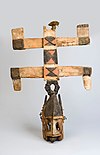| Part of a series on |
| Traditional African religions |
|---|
 |
Waaqeffanna is an ethnic religion indigenous to the Oromo people in the Horn of Africa.[1] The word Waaqeffanna is derived from Waaq which is the ancient name for the Creator in the Cushitic languages of both the Oromo people and Somali people in the Horn of Africa.[2][3][4] The followers of the Waaqeffanna religion are called Waaqeffataa and they believe in the supreme being Waaqa Tokkicha (the one God).[5] It is estimated that about 3% of the Oromo population, which is 1,095,000 Oromos, in present day Ethiopia actively practice this religion. Some put the number around 300,000, depending on how many subsets of the religion one includes. This number is still up for debate by many African religious scholars.[6]
O wonder! O wonder! . . . The wonders are six: The hornbill complains without
being sick; the plant flourishes without nourishment; the water runs without being
urged; the earth is fixed without pegs; the heavens hold themselves up without
supports; in the firmament He (God) has sown the chick-peas of heaven. These
things fill me with wonder. Let us all pray to God! O God, who hast caused me to
pass the day cause me to pass the night well!— The Waaqeffannaa song, in "The Folk-Literature of the Oromo."[7]
- ^ De Salviac, Martial. An Ancient People: Great African Nation: the Oromo. Translation from the 1901 original French edition by Ayalew Kanno. Paris, the French Academy, 2005
- ^ Thomas, Douglas; Alanamu, Temilola (2018-12-31). African Religions: Beliefs and Practices through History. ABC-CLIO. ISBN 978-1-61069-752-1.
- ^ Mohamed Diriye Abdullahi, Culture and Customs of Somalia, (Greenwood Publishing Group: 2001), p.65.
- ^ Bartels, Lambert. 1983. Oromo Religion Myths and Rites of the Western Oromo of Ethiopia: An Attempt to Understand. Berlin: Dietrich Reimer Verlag.
- ^ "Qaallu Institution: A theme in the ancient rock-paintings of Hararqee—implications for social semiosis and history of Ethiopia". ResearchGate. Retrieved 2019-01-16.
- ^ CSA, (2007) “Summary and Statistical Report of the 2007 Population and Housing Census”, Available http://www.ethiopia.gov.et/English/Information/Pages/RegionalStates.aspx
- ^ Enrico Cerulli. "The Folk-Literature of the Galla.". p. 137.
© MMXXIII Rich X Search. We shall prevail. All rights reserved. Rich X Search
